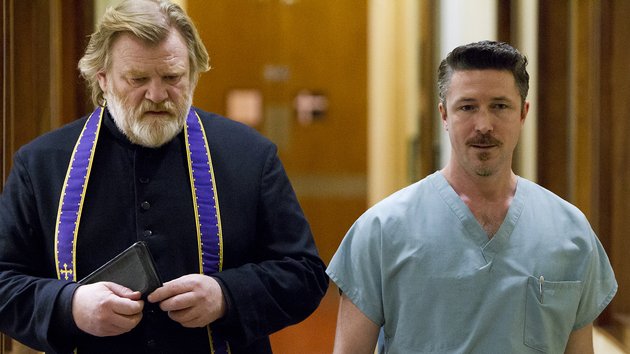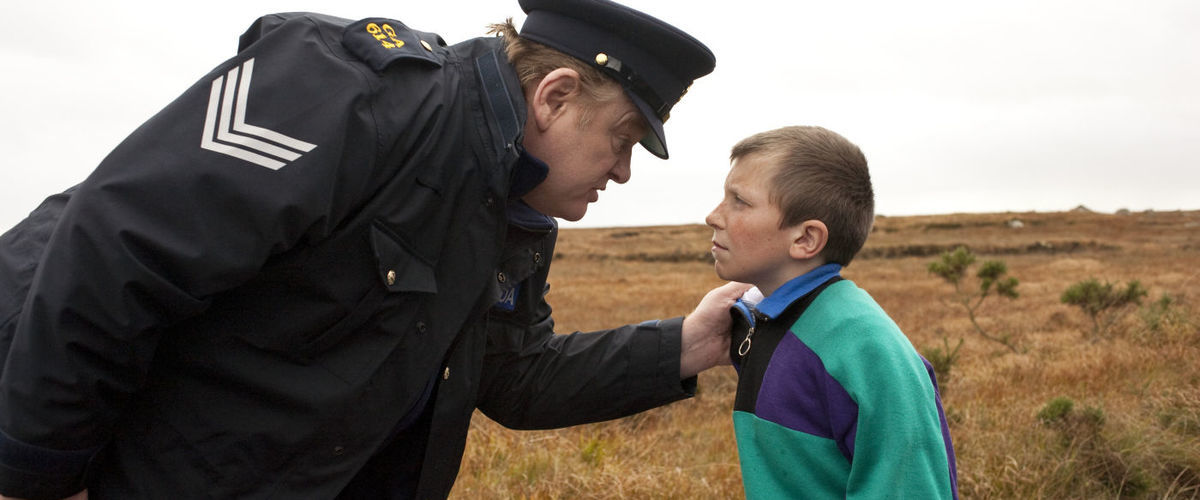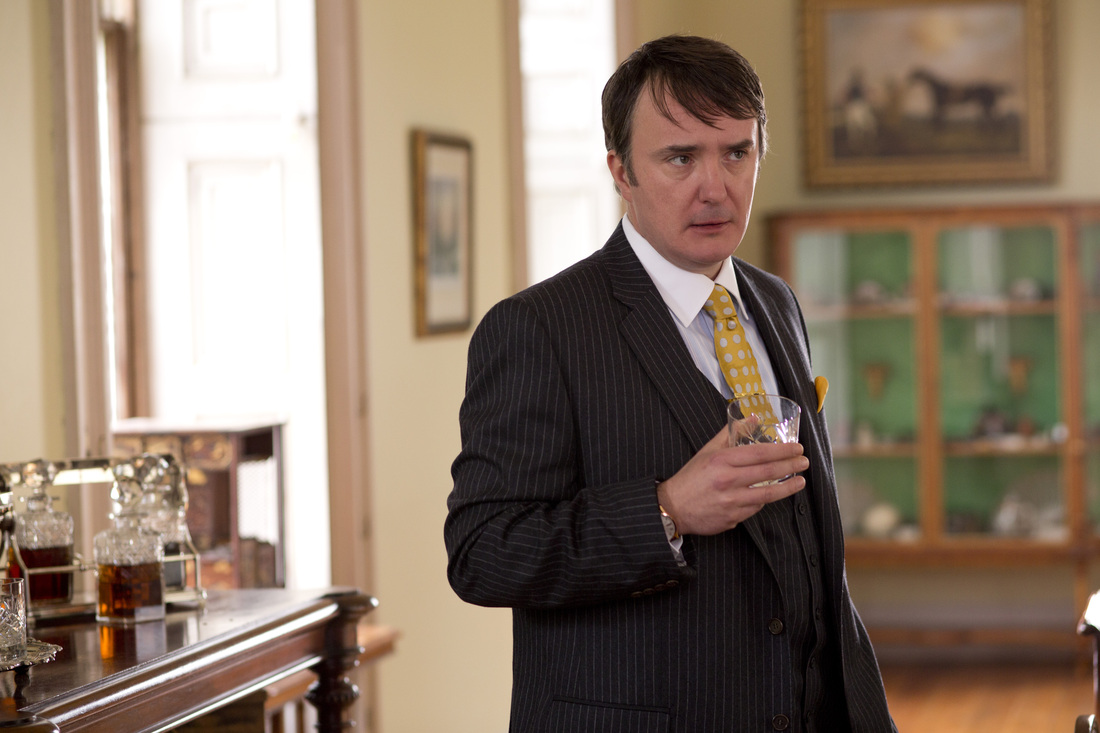Darkness, darkness. Poor Father James (Brendan Gleeson) may be a priest in Count Sligo, but his parish seems more a hell on earth than the picturesque Atlantic Coast of Ireland. This apparently good priest is made to answer not only for the trangressions of his church, but all of the pent-up outrage of his country in the early 21st century. "You have to put up with shit like this on a regular basis?" asks his visiting daughter, Fiona (Kelly Reilly). "There's a lot of it going around, let's put it that way," responds the weary man.
Calvary is, among several other things, the result of writer and director John Michael McDonagh avoiding the sophomore slump much more nimbly than his brother Martin. The younger McDonagh followed his highly original first feature In Bruges (2008) with the deeply mediocre Seven Psychopaths (2012). Perhaps the moral of that brief story is to make sure that you have Brendan Gleeson at the head of your cast. Gleeson played the older of two Irish hitmen hiding out in the eponymous Belgian city in Martin McDonagh's first feature, very much the grave heart of that bracing film. He was not among the strong cast assembled to minimal effect in Seven Psychopaths.
John Michael McDonagh has been wise enough to place the likable actor at the center of both of his films. Gleeson's Gerry Boyle is a Connemara law enforcement officer who is seen partaking of more vice than stamping it out in The Guard (2011). This time out, he's a feeling, well-intentioned, but no less unconventional priest, who answered the call relatively late in life after the death of his wife. The success of John Michael McDonagh's first two features has depended largely on Brendan Gleeson, so convincing as men replete with the sacred as well as the profane. More deeply, both films, perhaps not unlike the nation where they have been set, recognize the inextricable connection of those elements, or even how arbitrary can such distinctions be in end.
Calvary begins with a bang. Or as Father James says, "It's certainly a startling opening line." This his response to a man beginning an apparent confession by saying, "I first tasted semen when I was seven years old....Nothing to say?" The man on the other side of the confessional screen proceeds to unfurl yet another case of sexual abuse on the part of a Catholic priest that has hounded a child into adulthood. He sees no point in reporting the priest, who is now dead. "What good would it do anyway if he were still alive? What would be the point of killing the bastard? That would be no news. There's no point in killing a bad priest. Killing a good one? That would be a shock!" The good priest, of course, is the unfortunate Father James. He's told to get his affairs in order and meet his would-be assassin on the beach, Sunday week. Violence, then, is promised early on in Calvary. But as the days to the fateful meeting are announced on screen, it's in the moments of quiet amid the menacing noise of conflict in which the film makes its greatest impression. This McDonagh's juxtaposition of tone to match the darkness and light battling in the content of his story.
The troubling confession and promise of murder is merely the opening salvo against the priest, whose entire parish seems teeming with threats to his wellbeing, challenges to his faith. All of this complicated by the visit of his daughter Fiona from London.
Beyond its often thoughtful, occasional humorous marriage of the sacred and profane, Calvary bears the mark of the same hand that crafted The Guard. Young Michael Og is on hand in both films, operating as a kind of Dead End Kid by way of Shakespearean fool. In the film at hand, he's a smart-alecky altar boy to Father James, when not painting slightly otherworldly watercolors by the seaside, present, as in The Guard, at significant moments for Gleason's characters trying to find some meaning amid the chaos. There is also that particularly Irish dance with death. In McDonagh's first feature there was the dying mother of Gerry Boyle. With Calvary, Gleeson's character has to contend with his depressive daughter, who attempted suicide in the months before her visit to Ireland and would seem to require a bit of convincing to hold on to her particular mortal coil going forward. What is especially Irish here is the candor, immediacy and even humor with which the subject is met. When Father James sees his daughter's scarred wrists shortly after her arrival, he says,"Don't tell me, you made the classic error. You're supposed to cut down, not across."
At the pub are but a few of the locals who torment the priest, each in his fashion. Chief among them is Dr. Frank Harte (Aidan Gillen), whose manner and enunciation are as sharply groomed as his slightly demonic mustache and soul patch. Dr. Frank is all too happy to repeat the "You made the classic mistake" observation about Fiona. Much as he later owns - after he's wearily chided by Father James for his lack of originality - that good material is hard to come by: "Sure. The atheistic doctor. It's a cliched part to play. There aren't that many good lines. One part humanism to nine parts gallows humor."
 TThe doctor is one of several suspects that McDonagh places before us as the possible assassin of Father James. Another is a hapless local butcher Jack Brennan. This Chis O'Dowd, playing well against his usually charming type. The father calls upon Brennan not to investigate the threat against him, but to confront the man about the shiner borne by his wife, Veronica (Orla O'Rourke), which explains why the butcher's wife is first seen taking communion behind a large pair of sunglasses. The husband assures Father James that it wasn't him this time, but probably her lover, Simon (Isaach De Bankole, laconic as usual, as seen him in the films of Claire Denis, Jim Jarmusch and others, if more menacing in this case). Even the slightly battered Veronica has her sport with father James, alternately flogging the lost cause of her soul, or leading their exchanges into more suggestive directions:
TThe doctor is one of several suspects that McDonagh places before us as the possible assassin of Father James. Another is a hapless local butcher Jack Brennan. This Chis O'Dowd, playing well against his usually charming type. The father calls upon Brennan not to investigate the threat against him, but to confront the man about the shiner borne by his wife, Veronica (Orla O'Rourke), which explains why the butcher's wife is first seen taking communion behind a large pair of sunglasses. The husband assures Father James that it wasn't him this time, but probably her lover, Simon (Isaach De Bankole, laconic as usual, as seen him in the films of Claire Denis, Jim Jarmusch and others, if more menacing in this case). Even the slightly battered Veronica has her sport with father James, alternately flogging the lost cause of her soul, or leading their exchanges into more suggestive directions:
Forgive me, Father, for I have sinned.
Say one Our Father and ten Hail Mary's.
I've sinned more than that.
Make an ascent to Croagh Patrick, then. On your knees.
On my knees, is it? What made you say that?
 TThe doctor is one of several suspects that McDonagh places before us as the possible assassin of Father James. Another is a hapless local butcher Jack Brennan. This Chis O'Dowd, playing well against his usually charming type. The father calls upon Brennan not to investigate the threat against him, but to confront the man about the shiner borne by his wife, Veronica (Orla O'Rourke), which explains why the butcher's wife is first seen taking communion behind a large pair of sunglasses. The husband assures Father James that it wasn't him this time, but probably her lover, Simon (Isaach De Bankole, laconic as usual, as seen him in the films of Claire Denis, Jim Jarmusch and others, if more menacing in this case). Even the slightly battered Veronica has her sport with father James, alternately flogging the lost cause of her soul, or leading their exchanges into more suggestive directions:
TThe doctor is one of several suspects that McDonagh places before us as the possible assassin of Father James. Another is a hapless local butcher Jack Brennan. This Chis O'Dowd, playing well against his usually charming type. The father calls upon Brennan not to investigate the threat against him, but to confront the man about the shiner borne by his wife, Veronica (Orla O'Rourke), which explains why the butcher's wife is first seen taking communion behind a large pair of sunglasses. The husband assures Father James that it wasn't him this time, but probably her lover, Simon (Isaach De Bankole, laconic as usual, as seen him in the films of Claire Denis, Jim Jarmusch and others, if more menacing in this case). Even the slightly battered Veronica has her sport with father James, alternately flogging the lost cause of her soul, or leading their exchanges into more suggestive directions:Forgive me, Father, for I have sinned.
Say one Our Father and ten Hail Mary's.
I've sinned more than that.
Make an ascent to Croagh Patrick, then. On your knees.
On my knees, is it? What made you say that?
Yet another possible owner of that threatening voice in the confessional is local plutocrat, Michael Fitzgerald. Irish comedian and actor Dylan's Moran, typically arch, is the man abandoned by wife and child to roam his estate and many well-appointed rooms. He's one of several examples of supporting (threatening) characters, like the sharp-tongued doctor, rendered cutting but thin. Away from its center, Calvary is rescued a bit by those working in the roles so stylized by McDonagh.
The theme of havoc-wreaking bankers getting off scot-free is later picked up by the town's embittered publican (Pat Shortt):
"How come I never hear your mob preaching about that?
About what?
About all these bankers who have brought this country to its knees? I suppose when you have a history of screwing the Jews out of their money, and collaborating with the Nazis. It's like the pot calling the kettle black, eh?"
That amiable exchange all in a day's work for Father James.
So, quite enough dumped into the lap of the priest's soutane (which on posters for the film quite intentionally make Gleeson look like some figure in a Western, the outer garment flapping like a gunman's duster in the wind). But McDonagh gives him yet more, including the counseling of a French woman whose husband is killed in an accident, as well as a maddening visit to a young serial killer intent on playing at remorse so as to win admission to heaven. The father's life and death ruminations also find outlet in peppery discusssions with an aging writer (M. Emmet Walsh) to whom he ferries supplies. These conversations at least, like those with his daughter, offer some rare amity and rapport for the priest.
Little wonder that we see Father James crawl wearily into bed with his dog upon one return to his his home, Gleeson himself a sympathetic beast with his rumpled figure, full head of hair and creep of red-grey beard up his ample cheeks. Alas, both recumbent beasts eventually find themselves in harm's way.
McDonagh, abetted significantly by Gleeson, manages all this roiling strife gracefully enough to allow Calvary's reflective moments to breathe the film's richest atmosphere. Only in a couple of significant scenes does does the writer/director's taste for absurd extremes get the better of his story.
Not uncommon for a small Irish town, a good portion of the locals seem gathered at the public house one evening. Certainly most every one of Father James' antagonists and his potential assassin seem present. Veronica and her lover are found snorting cocaine in the lavatory. The aforementioned run-ins and come-ons with the pub owner and Veronica ensue, the circle of hell atmosphere only enhanced by the bordello red of the walls. Finally, someone tells the priest that his church is on fire. He doesn't take the remark seriously at first, but is made to look out the window and across the water to his church, very much in flames. "Jesus Christ," says the priest - cut to a statuette of J.C. himself amidst the hellish conflagration, the flames of which are then seen bursting out of cut-outs of crosses in the buildings front doors. This the dark or mordant humor to which so many reviews of Calvary allude. Also the chief instance of McDonagh going rather too far.
 Calvary has plenty of time to find itself and does so before the priest goes to meet the man who has promised to kill him on the beach. One more episode of keen violence awaits, but that very much in keeping with the dark logic of the film's plot. There is, finally, a scene of possible reconciliation after the reckoning. But is bloodletting necessary to bring it about? So easy to watch for all the aggrieved humanity that Brendan Gleeson brings to the role of the keenly-tested priest, Calvary ultimately lets no one off easy, audience and main character alike.
Calvary has plenty of time to find itself and does so before the priest goes to meet the man who has promised to kill him on the beach. One more episode of keen violence awaits, but that very much in keeping with the dark logic of the film's plot. There is, finally, a scene of possible reconciliation after the reckoning. But is bloodletting necessary to bring it about? So easy to watch for all the aggrieved humanity that Brendan Gleeson brings to the role of the keenly-tested priest, Calvary ultimately lets no one off easy, audience and main character alike. db





Very insightful. Thank you.
ReplyDelete